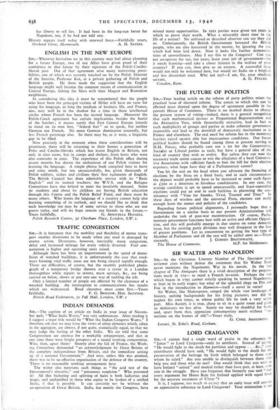ENGLISH IN THE NEW EUROPE
SIR,—Whatever hesitation we in this country may feel about planning for a future Europe, two of our Allies have given proof of their confidence in that future by their signature of the Polish-Czecho- Slovak pact Out of that agreement arise many interesting possi- bilities, one of which was recently touched on by the Polish Minister of the Interior, Professor Kot, at a private gathering of Polish and British people. He there made the suggestion that the English language might well become the common means of communication in Central Europe, linking the Slays with their Magyar and Rumanian neighbours.
In considering this idea it must be remembered that the people who have been the principal victims of Hitler will have no taste for using his language, so long the medium of business life, and France, alas, may well be in the shadow for a time in those intellectual circles where French has been the second language. Moreover the Polish-Czech agreement has certain implications besides the burial of the hatchet ; it means surely that East Central Europe intends to stand on its own feet, "federal feet" so to speak, but neither German nor French. No more German domination assuredly, but less French patronage also. So there may be, as it were, a linguistic gap to be filled.
Now precisely at the moment when these considerations will be prominent, there will be returning to their homes a generation of Poles and Czecho-Slovaks which has learnt English in Britain, not only in class room, but in camps and shelters, from hosts who were also comrades in arms. The experience of this Polish office during recent months has shown the enthusiasm of our Polish visitors for learning the language. A simple phrase book compiled here in haste and some mirth, but not unsuccessfully, has given thousands of Polish soldiers, sailors and civilians their first rudiments of English. The British Council has done admirable service with its "Basic English" and its trained teachers; the W.V.S. and the Refugee Committees have also helped to meet the insatiable demand. Some 30 students and about 6o children are having British education through this Centre and the Polish Relief Fund, and there must be many others. Who learns the language of a country cannot help also learning something of its outlook, and we should like to think that such knowledge too may be of some service to those who are our guests today, and will we hope remain our friends in the future.—










































 Previous page
Previous page